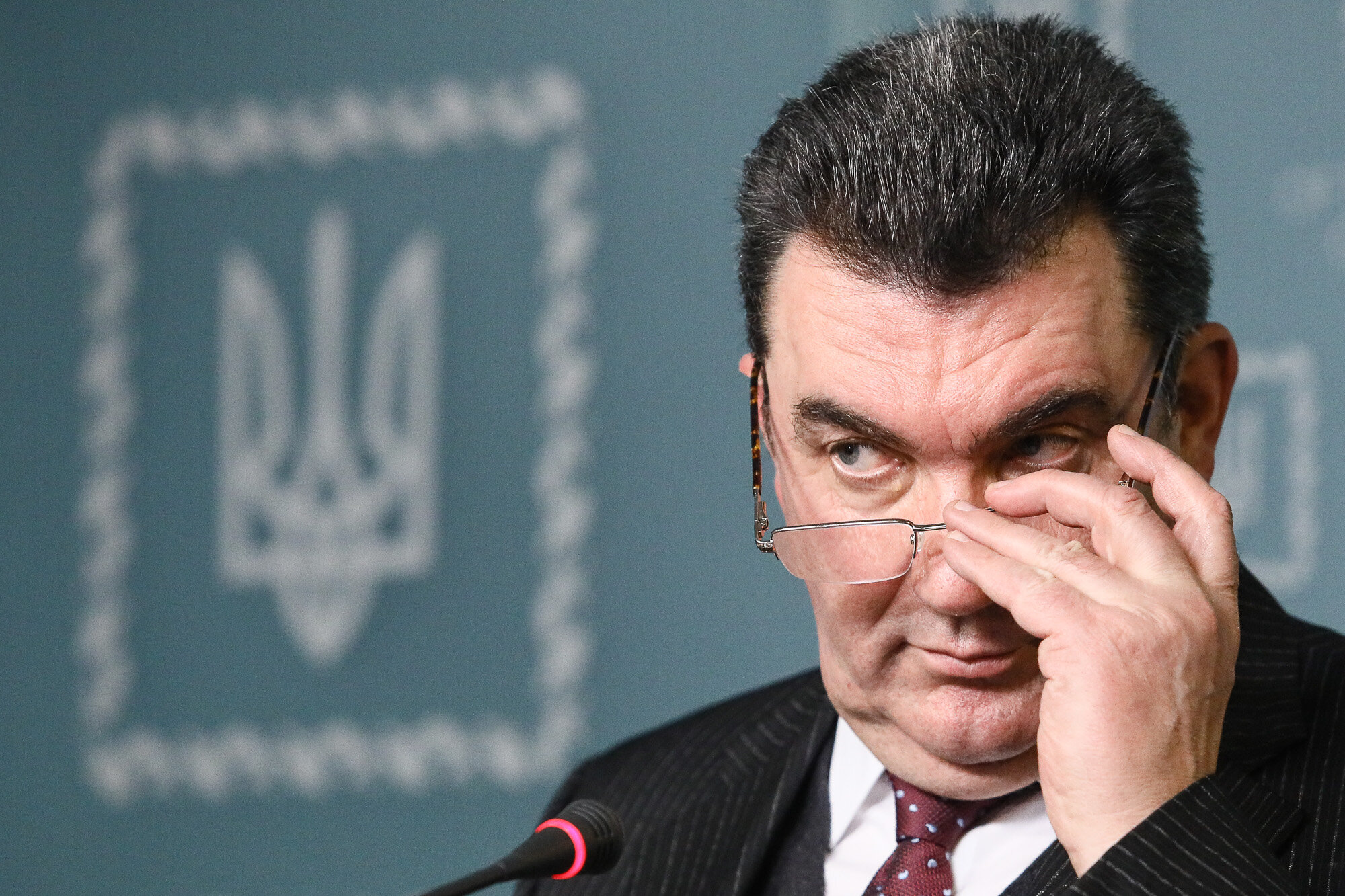Ukraine’s National Security and Defense Council on Feb. 19 imposed sanctions on Viktor Medvedchuk, a pro-Kremlin lawmaker and friend of Russian President Vladimir Putin.
Overall, the council imposed three-year sanctions on eight people and 19 companies, all for financing terrorism. All of them are linked to Medvedchuk.
Among the sanctioned citizens is Medvedchuk’s wife, Oksana Marchenko, who is the official owner of most of the family’s business assets.
Medvedchuk is the leader of Opposition Platform – For Life, a pro-Kremlin party and the second-largest faction in parliament, with 44 seats.
As a result of the sanctions, all assets owned by Medvedchuk and his associates will be frozen.
The decision comes two weeks after the council on Feb. 2 issued personal sanctions against Medvedchuk’s closest ally, pro-Kremlin lawmaker Taras Kozak and his three nationwide TV channels – NewsOne, Channel 112, and ZIK, which aired Kremlin propaganda about Ukraine.
As a result of the sanctions, the channels immediately shut down. The council on Feb. 19 also imposed sanctions on Natalia Lavreniuk, Kozak’s wife.
Back in 2014, the U.S. sanctioned Medvedchuk for “being a threat to Ukraine’s sovereignty and territorial integrity.”
Medvedchuk is a close friend of Putin and has been his unofficial representative in Ukraine. Putin is also the godfather of Medvedchuk’s youngest daughter.
Sanctioning Medvedchuk
The eight people added to the sanction list are Ukrainian citizens Medvedchuk, Marchenko and Lavreniuk and Russian citizens Konstantin Vatskovsky, Vitaly Domchenko, Sergey Lisogor, Alexander Maslyuk and Mikhail Popov.
Everyone on that list is believed to serve Medvedchuk’s interests.
The lawmaker’s Russian-based oil businesses are registered to his wife, Marchenko, while his Ukrainian media holdings were officially registered to his close friend Kozak.
In turn, Kozak re-registered some of his assets to his wife, Lavreniuk.
Medvedchuk and his allies never made it a secret that he runs these companies. Medvedchuk stated on NewsOne that he controls the business registered to his wife, who is a well-known Ukrainian TV host. Lawmaker Vadim Rabinovich, co-head of the Opposition Platform party, wrote that the Feb. 2 sanctions were imposed on “Medvedchuk’s TV channels.”
“Kozak is Medvedchuk’s wallet, through which he finances Russian hybrid warfare projects against Ukraine,” said Vitaly Shabunin, head of the Anti Corruption Action Center. “(Kozak’s channels) are not media, they are instruments of Russia’s hybrid warfare against Ukraine.”
All people linked to Medvedchuk were sanctioned for sponsoring terrorism. According to the National Security and Defence Council, the sanctions concern illegal shipments of coal from occupied Donbas.
Profits from the illegal coal trade allegedly funded the three TV channels Kozak owns.
Among the eight people sanctioned, two – Masyuk and Lisogor – own Russian-based company Don Coal (Donskie Ugly) that is responsible for transporting coal from the occupied territories.
Since Russia invaded Ukraine in 2014 and occupied the coal-rich eastern Donbas region, Ukraine has had an ongoing coal deficit.
In 2016, the Ukrainska Pravda news outlet published an investigation alleging that Kozak took part in a scheme in which coal from occupied Donbas was passed off as South African coal.
According to documents obtained by Ukrainska Pravda, Ukraine was officially buying coal from South Africa but the coal actually came from Donbas and was shipped through the Russian port city of Rostov-on-Don instead of Ukrainian ports.
Russian pipe
Among the nineteen companies that were sanctioned, the most notable is Prikarpatzahidtrans, an oil pipeline operator used to transport Russian diesel fuel into Ukraine and the European Union.
The company exploits 800 kilometers of oil pipelines running through six Ukrainian regions. In 2017, the company was responsible for transporting over 40% of Ukraine’s diesel fuel.
Prikarpatzahidtrans is officially owned by Belarusian businessman Nikolai Vorobyov and Swiss-based company International Trading Partners AG, owned by Anatoly Shefer. According to Ukrainian media, Shefer is linked to Medvedchuk.
The National Security and Defence Council of Ukraine believes that the company was stolen from Ukraine and is controlled by Russia and its Ukrainian proxies.
“Starting from 1991, if someone stole something from Ukraine, they must return it,” said Oleksandr Danilov, the Council’s secretary, after breaking the news on sanctions against Medvedchuk.

Oleksiy Danilov, the Secretary of the National Security and Defense Council of Ukraine (RNBO), announces the council’s decision to impose sanctions against Viktor Medvedchuk and his associates at a press briefing on Feb. 19, 2021. (Oleg Petrasiuk)
According to the National Anti-Corruption Bureau of Ukraine (NABU), after the breakup of the Soviet Union, the pipeline now owned by Prikarpatzahidtrans was due to be transferred to independent Ukraine.
That never happened.
Instead, the pipeline was privatized by the Russian state-controlled pipeline operator Transneft. In 2016, Transneft sold the pipeline to a low-profile Swiss company linked to Medvedchuk.
On Feb. 11, NABU charged the former Deputy Head of Ukraine’s Institute of Nitrogen Industry and Organic Synthesis Products with abuse of office.
According to NABU, the ex-official’s false statements gave the Rivne City Court grounds to deny Ukraine the right to nationalize the pipeline.
“The fact is that there was no (official) privatization of this piece of Ukrainian property,” said Danilov.
“In our opinion, in a way that is still incomprehensible, this piece of state property without (an official) privatization, without the (supervision of the) State Property Fund, ended up in the hands of owners registered in a foreign country,” he added.
